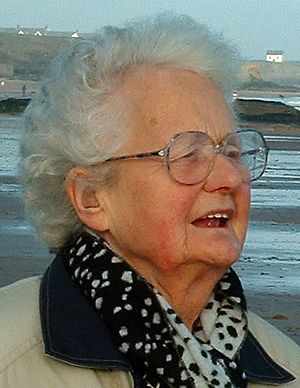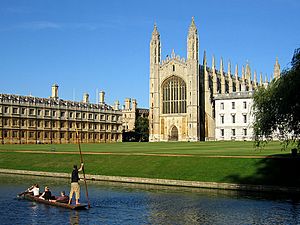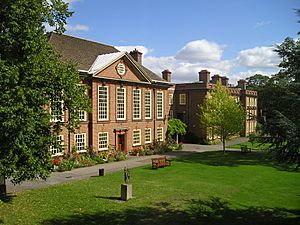Mary Midgley facts for kids
Quick facts for kids
Mary Midgley
|
|
|---|---|
 |
|
| Born |
Mary Scrutton
13 September 1919 London, England
|
| Died | 10 October 2018 (aged 99) Jesmond, Newcastle, England
|
| Alma mater | Somerville College, Oxford |
|
Notable work
|
Beast and Man (1978), Animals and Why They Matter (1983), Evolution as a Religion (1985), Science as Salvation (1992) |
| Spouse(s) | Geoffrey Midgley (m. 1950, d. 1997) |
| Awards | Honorary D. Litt (1995), Durham University; Honorary DCL (2008), Newcastle University |
| Era | Contemporary philosophy |
| Region | Western philosophy |
| School | Analytic philosophy |
|
Main interests
|
Moral philosophy, animal rights, philosophy of science, ethology, evolution |
|
Notable ideas
|
Humans as ethical primates |
|
Influences
|
|
Mary Beatrice Midgley (née Scrutton; 13 September 1919 – 10 October 2018) was a British philosopher. A senior lecturer in philosophy at Newcastle University, she was known for her work on science, ethics and animal rights. She wrote her first book, Beast and Man (1978), when she was in her late fifties, and went on to write over 15 more, including Animals and Why They Matter (1983), Wickedness (1984), The Ethical Primate (1994), Evolution as a Religion (1985), and Science as Salvation (1992). She was awarded honorary doctorates by Durham and Newcastle universities. Her autobiography, The Owl of Minerva, was published in 2005.
Midgley strongly opposed reductionism and scientism, and argued against any attempt to make science a substitute for the humanities. She wrote extensively about what she thought philosophers can learn from nature, particularly from animals. Midgley insisted that humans ought to be understood as first and foremost, a kind of animal. Several of her books and articles discussed philosophical ideas appearing in popular science, including those of Richard Dawkins. She also wrote in favour of a moral interpretation of the Gaia hypothesis. The Guardian described her as a fiercely combative philosopher and the UK's "foremost scourge of 'scientific pretension'".
Contents
Early life
Midgley was born in London to Lesley and Tom Scrutton. Her father, the son of the eminent judge Sir Thomas Edward Scrutton, was a curate in Dulwich and later chaplain of King's College, Cambridge. She was raised in Cambridge, Greenford and Ealing, and educated at Downe House School in Cold Ash, Berkshire, where she developed her interest in classics and philosophy:

[A] new and vigorous Classics teacher offered to teach a few of us Greek, and that too was somehow slotted into our timetables. We loved this and worked madly at it, which meant that with considerable efforts on all sides, it was just possible for us to go to college on Classics … I had decided to read Classics rather than English – which was the first choice that occurred to me – because my English teacher, bless her, pointed out that English literature is something that you read in any case, so it is better to study something that you otherwise wouldn't. Someone also told me that, if you did Classics at Oxford, you could do Philosophy as well. I knew very little about this but, as I had just found Plato, I couldn't resist trying it.

Midgley took the Oxford entrance exam in the autumn of 1937, gaining a place at Somerville College. During the year before starting university, it was arranged that she would live in Austria for three months to learn German, but she had to leave after a month because of the worsening political situation. At Somerville she studied Mods and Greats alongside Iris Murdoch, graduating with first-class honours degree.
Several of her lasting friendships that began at Oxford were with scientists, and she credited them with having educated her in a number of scientific disciplines. After a split in the Labour club at Oxford over the Soviet Union's actions, she was on the committee of the newly formed Democratic Socialist Club alongside Tony Crosland and Roy Jenkins.
During Midgley's time at Oxford, many of the young male undergraduates left to fight in the Second World War. This left the women undergraduates in an unlikely positions: for the first time they made up the majority in the student body. Recalling this time, Midgley writes "I think myself that this experience has something to do with the fact that Elizabeth [Anscombe] and I and Iris [Murdoch] and Philippa Foot and Mary Warnock have all made our names in philosophy... I do think that in normal times a lot of good female thinking is wasted because it simply doesn't get heard." Interest in the philosophy of the women philosophers at this time sparked the interest of two philosophers at Durham University, who began a project called In Parenthesis which explores the connections between four women philosophers (Foot, Anscombe, Midgley and Murdoch).
Career
Midgley writes that career in philosophy may have been affected by women having a greater voice in discussion at the time, because many male undergraduates left after a year to fight in the war.
Midgley left Oxford in 1942 and went into the civil service, as "the war put graduate work right out of the question". Instead, she "spent the rest of the war doing various kinds of work that were held to be of national importance". During this time she was also a teacher at Downe School and Bedford School. She returned to Oxford in 1947 to do graduate work with Gilbert Murray. She began research on Plotinus's view of the soul, which she has described as "so unfashionable and so vast that I never finished my thesis". In retrospect Midgley has written of her belief that she is "lucky" to have missed out in having a doctorate. She argues that one of the main flaws in doctoral training is that, while it "shows you how to deal with difficult arguments", it does not "help you to grasp the big questions that provide its context – the background issues out of which the small problems arose."
In 1949 Midgley went to Reading University, teaching in the philosophy department there for four terms. In 1950 she married Geoffrey Midgley (died 1997), also a philosopher. They moved to Newcastle, where he got a job in the philosophy department of Newcastle University. Midgley stopped teaching for several years while she had three sons (Tom, David and Martin), before also getting a job in the philosophy department at Newcastle, where she and her husband were both "much loved". Midgley taught there between 1962 and 1980. During her time at Newcastle, she began studying ethology and this led to her first book, Beast and Man (1978), published when she was 59. "I wrote no books until I was a good 50, and I'm jolly glad because I didn't know what I thought before then."
Awards
Midgley was awarded an honorary D.Litt. by Durham University in 1995 and an honorary Doctor of Civil Law by Newcastle University in 2008. She was an honorary fellow of the Policy, Ethics and Life Sciences Research Centre at Newcastle University. In 2011 she was the first winner of the Philosophy Now Award for Contributions in the Fight Against Stupidity.
Death
Midgley died at the age of 99 in Jesmond on 10 October 2018.
Midgley in art
Midgley is referred to in The Lives of Animals (1999), a work of fiction by the South African novelist J. M. Coetzee.
Coetzee and Midgley shared a longstanding fascination with Robinson Crusoe. Coetzee retells the Crusoe story in his novel Foe, while Midgley wrote about Crusoe in her essay "Duties Concerning Islands." Midgley's essay argued for the idea that human beings can have ethical obligations to non-human entities such as animals and ecosystems, an idea also found in The Lives of Animals, Foe and many other works by Coetzee.
Midgley agreed to sit for sculptor Jon Edgar in Newcastle during 2006, as part of the Environment Triptych, along with heads of Richard Mabey and James Lovelock. This was exhibited at Yorkshire Sculpture Park in 2013.
See also
 In Spanish: Mary Midgley para niños
In Spanish: Mary Midgley para niños

